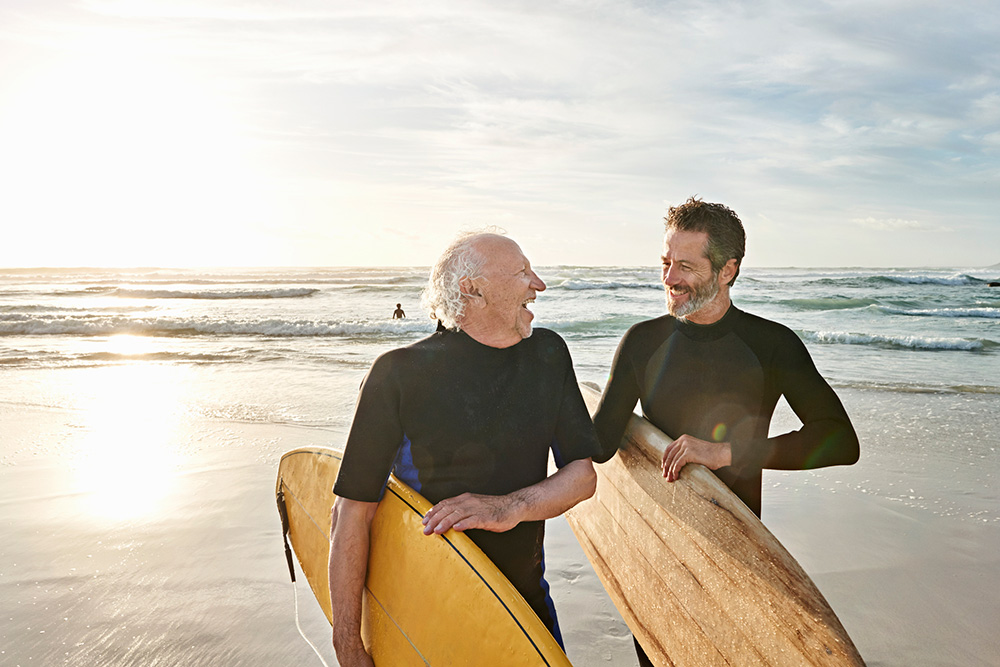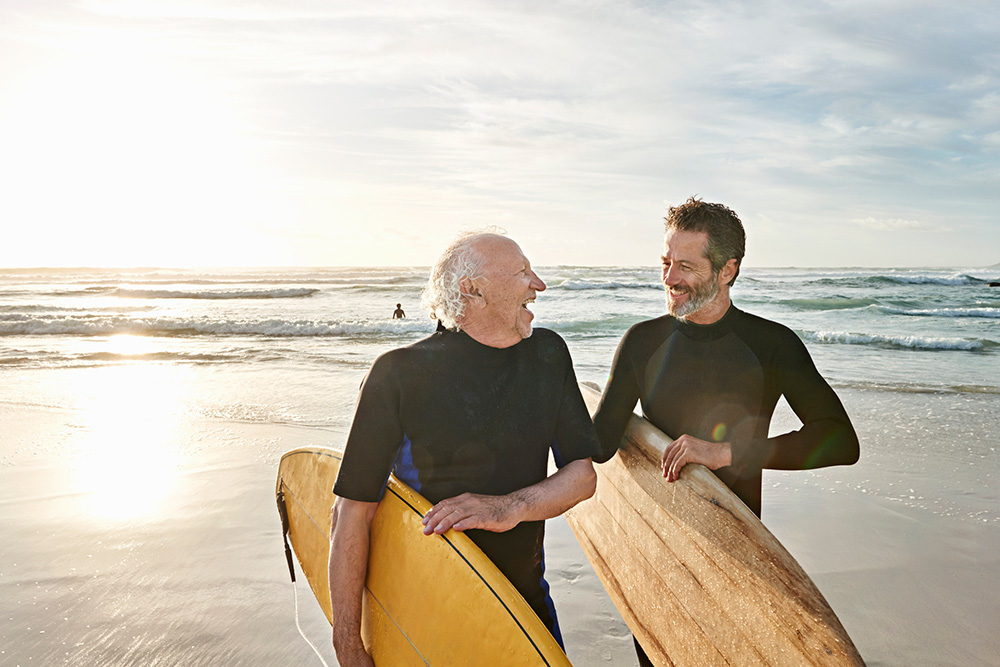
覺得自己比實際年齡更年輕?雖然你的年齡快到45歲,但認為自己有一顆25歲年輕人的心?現在你的身材比讀研究生的時候更有型?一款新應用程序承諾可以利用尖端科技,幫助你確定自己的感覺是否準確。
香港科技公司Deep Longevity開發的iPhone應用程序Young. ai將使用一系列“生物鐘”算法,根據血樣信息和從可穿戴健身跟蹤設備上收集的數據,甚至用戶的面部照片,計算出用戶的生物學年齡。
一個人的生物學年齡,是根據一系列指標評估其衰老速度的一種方式。由于健康、生活方式以及遺傳基因等因素的影響,生物學年齡可能與實際年齡存在差異。例如,50歲的超級馬拉松運動員的生物學年齡,可能比35歲的宅男宅女更年輕。
預計Young. ai應用程序將于9月29日在蘋果公司的應用商店上線。該應用承諾不僅會告訴用戶其當前的生物學年齡,還會預測用戶的衰老速度,并建議從體育鍛煉到節食等各種個性化的干預措施,幫助用戶延緩甚至逆轉衰老。
Deep Longevity的創始人兼首席執行官亞歷克斯·扎沃隆科夫說:“我們希望幫助所有人延長壽命,提高生活質量,不論他們的國籍、種族、性別或社會地位。”扎沃隆科夫自封為公司的CLO,即“首席長壽官”。同樣由扎沃隆科夫創立的Insilico Medicine拆分之后成立了Deep Longevity公司。
他說,該公司希望提供醫療或生活方式干預措施建議,“幫助用戶恢復到更接近黃金年齡的狀態,通常是20至40歲。很可惜,人過了40歲以后身體狀況會開始走下坡路。”
該應用程序中包含為每位用戶提供的個性化措施清單,用戶可以通過這些措施延緩或逆轉衰老過程。
用高科技實現長壽
與Young. ai類似的“長壽科技”引起越來越多消費者和投資者的關注。谷歌(Google)母公司Alphabet旗下的初創公司Calico,致力于研究延長人類壽命的各種方法。塞雷拉基因組(Celera Genomics)的創始人克雷格·文特爾曾經參與繪制人類基因圖譜。他參與創建的加州初創公司Human Longevity,同樣致力于研究實現長壽的方法。(Deep Longevity與Human Longevity合作開發部分生物鐘算法。)Human Longevity最近被英國億萬富翁詹姆斯·梅隆創立的香港上市公司勵晶太平洋(Regent Pacific)收購。梅隆投資了多家致力于逆轉人類衰老的公司。
Young. ai應用程序將按照20個不同指標評估用戶的生物學年齡,并提供對用戶生物學年齡的整體預測,Deep Longevity將評估得分稱為“AgeMetric”。
扎沃隆科夫說:“我們認為應該使用多個衰老時鐘。我們認為沒有一種通用的時鐘,但可以使用來自不同形態的衰老時鐘的數據進行綜合評估。”
Young. ai提供的最簡單的生物鐘具有年齡預測功能,該功能基于用戶用手機攝像頭拍攝的面部照片。其他功能包括通過健身跟蹤裝置評估用戶的心律。這款應用程序能夠搭配Apple Watch和Fitbit健身跟蹤裝置使用。有些指標需要根據用戶對一些簡單的應用程序內問題的回答,包括他們的精神健康及其對自身年齡和衰老過程的感覺等。
該應用程序支持的其他指標需要經過復雜的實驗室檢測,例如對用戶轉錄組(對人體細胞功能至關重要的一種分子)的分析,或者對生活在人體表面或體內的微生物組的評估等。
扎沃隆科夫表示,Deep Longevity公司希望Young. ai應用程序可以鼓勵用戶與醫生談論衰老和長壽話題。該項服務還將推出桌面版,將為用戶和醫生提供更豐富的功能。
他表示,未來,Young. ai的用戶能夠直接通過該應用訂購或預約更復雜的檢測。這款應用程序最終可能支持用戶查找和聯系營養師、私人教練和健康專家,幫助他們執行應用程序中推薦的措施,延緩衰老過程,在許多情況下甚至可以逆轉衰老。
成本
該應用持續將采取“免費增值”模式,一些較為簡單的生物鐘和綜合年齡評分將免費提供,但有些更復雜的生物鐘需要付費解鎖。扎沃隆科夫說,Deep Longevity曾經希望能夠推出Young. ai應用程序的安卓版,但這個版本可能需要再等待一段時間。
他說公司正在與多家保險公司商談未來的合作,但他拒絕透露保險公司的名稱。他說,幫助人們實現健康長壽這個目標,既符合保險公司的利益,也符合他們客戶的利益。
但保險公司也可能會利用Young. ai強大的預測分析,向生物學年齡更高或衰老速度更快的患者收取更高的醫療保險或人壽保險保費,甚至拒絕承保。
扎沃隆科夫說,按照該應用程序的條款和條件,用戶將授權Deep Longevity利用他們的數據進行匿名研究。他表示,公司將遵守法律規定,在任何研究項目中使用用戶數據時,額外獲得用戶同意。
他說:“我們很清楚當前的監管環境。我們保證,不會在未經同意的情況下將任何人的數據用于研究。”
扎沃隆科夫稱,根據不同數據類型計算生物學年齡的算法,以及AgeMetric評分機制,都已經取得專利,或者正在申請專利。該公司在同行審議科學期刊上公布了不同“生物鐘”算法所依據的部分研究,其中許多算法利用人工智能根據數據進行預測。(財富中文網)
翻譯:劉進龍
審校:汪皓

覺得自己比實際年齡更年輕?雖然你的年齡快到45歲,但認為自己有一顆25歲年輕人的心?現在你的身材比讀研究生的時候更有型?一款新應用程序承諾可以利用尖端科技,幫助你確定自己的感覺是否準確。
香港科技公司Deep Longevity開發的iPhone應用程序Young. ai將使用一系列“生物鐘”算法,根據血樣信息和從可穿戴健身跟蹤設備上收集的數據,甚至用戶的面部照片,計算出用戶的生物學年齡。
一個人的生物學年齡,是根據一系列指標評估其衰老速度的一種方式。由于健康、生活方式以及遺傳基因等因素的影響,生物學年齡可能與實際年齡存在差異。例如,50歲的超級馬拉松運動員的生物學年齡,可能比35歲的宅男宅女更年輕。
預計Young. ai應用程序將于9月29日在蘋果公司的應用商店上線。該應用承諾不僅會告訴用戶其當前的生物學年齡,還會預測用戶的衰老速度,并建議從體育鍛煉到節食等各種個性化的干預措施,幫助用戶延緩甚至逆轉衰老。
Deep Longevity的創始人兼首席執行官亞歷克斯·扎沃隆科夫說:“我們希望幫助所有人延長壽命,提高生活質量,不論他們的國籍、種族、性別或社會地位。”扎沃隆科夫自封為公司的CLO,即“首席長壽官”。同樣由扎沃隆科夫創立的Insilico Medicine拆分之后成立了Deep Longevity公司。
他說,該公司希望提供醫療或生活方式干預措施建議,“幫助用戶恢復到更接近黃金年齡的狀態,通常是20至40歲。很可惜,人過了40歲以后身體狀況會開始走下坡路。”
該應用程序中包含為每位用戶提供的個性化措施清單,用戶可以通過這些措施延緩或逆轉衰老過程。
用高科技實現長壽
與Young. ai類似的“長壽科技”引起越來越多消費者和投資者的關注。谷歌(Google)母公司Alphabet旗下的初創公司Calico,致力于研究延長人類壽命的各種方法。塞雷拉基因組(Celera Genomics)的創始人克雷格·文特爾曾經參與繪制人類基因圖譜。他參與創建的加州初創公司Human Longevity,同樣致力于研究實現長壽的方法。(Deep Longevity與Human Longevity合作開發部分生物鐘算法。)Human Longevity最近被英國億萬富翁詹姆斯·梅隆創立的香港上市公司勵晶太平洋(Regent Pacific)收購。梅隆投資了多家致力于逆轉人類衰老的公司。
Young. ai應用程序將按照20個不同指標評估用戶的生物學年齡,并提供對用戶生物學年齡的整體預測,Deep Longevity將評估得分稱為“AgeMetric”。
扎沃隆科夫說:“我們認為應該使用多個衰老時鐘。我們認為沒有一種通用的時鐘,但可以使用來自不同形態的衰老時鐘的數據進行綜合評估。”
Young. ai提供的最簡單的生物鐘具有年齡預測功能,該功能基于用戶用手機攝像頭拍攝的面部照片。其他功能包括通過健身跟蹤裝置評估用戶的心律。這款應用程序能夠搭配Apple Watch和Fitbit健身跟蹤裝置使用。有些指標需要根據用戶對一些簡單的應用程序內問題的回答,包括他們的精神健康及其對自身年齡和衰老過程的感覺等。
該應用程序支持的其他指標需要經過復雜的實驗室檢測,例如對用戶轉錄組(對人體細胞功能至關重要的一種分子)的分析,或者對生活在人體表面或體內的微生物組的評估等。
扎沃隆科夫表示,Deep Longevity公司希望Young. ai應用程序可以鼓勵用戶與醫生談論衰老和長壽話題。該項服務還將推出桌面版,將為用戶和醫生提供更豐富的功能。
他表示,未來,Young. ai的用戶能夠直接通過該應用訂購或預約更復雜的檢測。這款應用程序最終可能支持用戶查找和聯系營養師、私人教練和健康專家,幫助他們執行應用程序中推薦的措施,延緩衰老過程,在許多情況下甚至可以逆轉衰老。
成本
該應用持續將采取“免費增值”模式,一些較為簡單的生物鐘和綜合年齡評分將免費提供,但有些更復雜的生物鐘需要付費解鎖。扎沃隆科夫說,Deep Longevity曾經希望能夠推出Young. ai應用程序的安卓版,但這個版本可能需要再等待一段時間。
他說公司正在與多家保險公司商談未來的合作,但他拒絕透露保險公司的名稱。他說,幫助人們實現健康長壽這個目標,既符合保險公司的利益,也符合他們客戶的利益。
但保險公司也可能會利用Young. ai強大的預測分析,向生物學年齡更高或衰老速度更快的患者收取更高的醫療保險或人壽保險保費,甚至拒絕承保。
扎沃隆科夫說,按照該應用程序的條款和條件,用戶將授權Deep Longevity利用他們的數據進行匿名研究。他表示,公司將遵守法律規定,在任何研究項目中使用用戶數據時,額外獲得用戶同意。
他說:“我們很清楚當前的監管環境。我們保證,不會在未經同意的情況下將任何人的數據用于研究。”
扎沃隆科夫稱,根據不同數據類型計算生物學年齡的算法,以及AgeMetric評分機制,都已經取得專利,或者正在申請專利。該公司在同行審議科學期刊上公布了不同“生物鐘”算法所依據的部分研究,其中許多算法利用人工智能根據數據進行預測。(財富中文網)
翻譯:劉進龍
審校:汪皓
Feel young for your age? Think you have the mind of a 25-year-old, even though you’re pushing 45? Are you in better shape now than when you were in grad school? A new app promises to use cutting-edge science and technology to tell you if you’re right.
Young.ai, an iPhone app created by Hong Kong–based technology company Deep Longevity, will use a variety of “biological clock” algorithms to compute a user’s biological age based on everything from blood samples and data collected from wearable fitness trackers to a simple photograph of the user’s face.
A person’s biological age is a way of assessing how rapidly a person is aging based on a number of indicators. It can differ from a person’s chronological age owing to health and lifestyle factors, as well as genetics. For instance, a 50-year-old ultramarathoner might have a younger biological age than a 35-year-old couch potato.
The Young.ai app, which is expected to debut on Apple’s App Store on Sept. 29, promises to not only tell a user her current biological age, but make predictions about the rate at which she is aging and then recommend personalized interventions—from exercise to diet—that could slow, or even possibly reverse, some of the effects of aging.
“We want to help everyone on the planet live longer and better regardless of their nationality, race, gender, or social status,” says Alex Zhavoronkov, who bills himself as the CLO—or “chief longevity officer”—of Deep Longevity, a company he also founded and runs as chief executive officer. The company was spun out of Insilico Medicine, which Zhavoronkov also founded.
He said the company wanted to provide advice on medical or lifestyle interventions that would “bring you a little back, closer to the age of your optimal performance, which for humans is usually between ages 20 to 40. After that we have, unfortunately, this declining path.”
The app will include a checklist of personalized steps that each user can take to help slow or reverse the aging process.
Longevity goes high-tech
“Longevity tech,” such as Young.ai is increasingly attracting interest from both consumers and investors. Alphabet, the parent company of Google, owns Calico, a startup researching ways to extend human life spans. Craig Venter, the entrepreneur who founded Celera Genomics and helped map the human genome, has cofounded Human Longevity, a California startup pursuing similar ideas. (Deep Longevity has a partnership with Human Longevity on some biological clock methods.) Deep Longevity itself was recently purchased by Regent Pacific, a publicly traded Hong Kong company founded by British billionaire James Mellon, who has funded a number of ventures dedicated to reversing human aging.
The Young.ai app will assess a user’s biological age across up to 20 different metrics as well as providing an overall prediction of a person’s biological age, a score that Deep Longevity calls the “AgeMetric.”
“We believe in using multiple aging clocks," Zhavoronkov said. “We believe there is no universal clock, but we can work with data from completely different modalities and combine those.”
The simplest of the biological clocks offered by Young.ai is an age-prediction feature based on a photograph of the user’s face taken with their mobile phone camera. Others include an assessment of a user’s heart rate, which can be obtained from a fitness tracker. The app is designed to integrate with both the Apple Watch and Fitbit fitness trackers. And some of the metrics are based on users answering simple questions in the app about their mental health and their own feeling about their age and aging process.
But other metrics that the app supports, such as analysis of a user’s transcriptome, a molecule essential to cell function, or assessment of a person’s microbiome, the microbes that live on and in our bodies, require sophisticated lab tests.
Zhavoronkov said Deep Longevity hoped the Young.ai app would help encourage discussions between users and their doctors about aging and longevity. There will also be a desktop version of the service available with an even richer set of features for users and their doctors to explore.
He said that in the future, Young.ai users might be able to order or book these more sophisticated tests directly through the app. The app might also eventually enable users to find and contact dietitians, personal trainers, and specialist health professionals who would be able help them take the steps the app recommends for slowing, or in a few cases reversing, the effects of aging.
What it costs
The app will operate on a freemium model, with some of the simpler biological clocks and combined age score available for free, but some of the more sophisticated clocks will require payment to unlock. Zhavoronkov said that Deep Longevity hoped to eventually launch an Android version of the Young.ai app, but that it would be some time before it was ready to do so.
He said that Deep Longevity is in discussions with several insurance companies, which he declined to name, about future partnerships. He said the interests of insurance companies and the interests of their customers were aligned when it came to the goal of helping people live longer, healthier lives.
But the powerful predictive analytics underpinning Young.ai could also potentially be used by insurance companies to charge patients with more advanced biological ages or who seemed to be aging faster higher premiums for health or life insurance, or perhaps to deny them coverage altogether.
Users will give Deep Longevity the right to conduct anonymized research using their data as part of the app’s terms and conditions, Zhavoronkov said. He said the company would comply with any laws that required additional consent from individuals to use their data in specific research projects.
“We are well aware of the regulatory environment, and we will ensure no one’s data is used for research in an unconsented way,” he said.
The algorithms used to compute a biological age for each of the different data types—as well as the AgeMetric scoring mechanism—are either patented or patent-pending, Zhavoronkov said. The company has published some of the research underpinning these different “biological clock” algorithms, many of which use artificial intelligence to make predictions based on the data, in peer-reviewed scientific journals.






